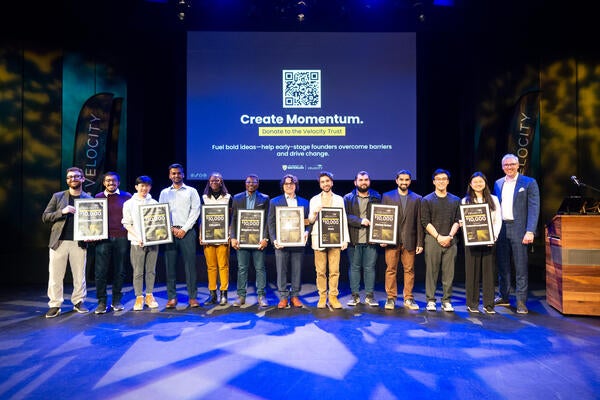
Coming into contact with COVID
Waterloo PhD student helps create an app that notifies users of potential exposure to COVID

Waterloo PhD student helps create an app that notifies users of potential exposure to COVID
By Ryon Jones Faculty of Mathematics
James Petrie
> PhD Candidate
> Department of Applied Mathematics
University of Waterloo student James Petrie is among a group of volunteers who have combined their knowledge to develop Covid Watch, an app that uses Bluetooth to detect when users are in proximity to each other and alerts them anonymously if they were in contact with someone later confirmed to have COVID-19. The app uses privacy-preserving measures so that no one, including the government, can track down who exposed whom.
Petrie, a PhD candidate in Waterloo’s Department of Applied Mathematics, got involved in an online effective altruism community just before the COVID-19 pandemic. He was actively looking at what he could do that would be beneficial to the world.
“When I first saw the news in mid-January about COVID-19, I started thinking how the stuff I’m good at could be used to help solve this sort of problem,” Petrie says. “I started thinking of ways to make the contact tracing system more effective.
The team behind Covid Watch has since grown to around 10-15 core contributors, as well as many more part-time volunteers and advisors. The researchers, programmers, security experts and public health professionals live across the globe.
The non-profit group believes scalable measures like an app are especially helpful in communities where contact tracing resources are too limited to match the scope of the pandemic. They’re building the app to provide components and tools that public health agencies can use to supplement their pre-existing efforts to fight COVID-19.
Contact tracing is a monitoring process used by organizations including the World Health Organization (WHO) that identifies when an infected person has come into contact with someone else and works to prevent further transmission of the virus.
The Bluetooth contact tracing app is currently at the beta-testing stage for both Android and iOS. They are actively in talks with WHO, the United States Digital Service and other government health agencies internationally, with the aim being to have a usable app finalized by early May.
In contrast to many existing mobile apps aimed at helping to reduce the spread of COVID-19, Covid Watch is being developed with a robust privacy model while still providing effective intervention.
The Bluetooth contact tracing system is being structured in a decentralized and anonymous way using randomly generated and locally stored ‘contact event numbers’ (CENs). After downloading the app on a Bluetooth-capable smartphone, the device will broadcast the CENs and also listen for CENs transmitted by nearby phones that have the app installed. A user of the app diagnosed with COVID-19 can then volunteer to share their contact history and upload all of their CENs to Covid Watch’s shared database. Other app users who may have come in contact with the diagnosed person will be alerted without being able to trace the information back to them.
“There is currently no COVID-19 vaccine which means we must build systems capable of rapidly containing local transmission wherever and whenever it appears,” Petrie says. “If we create a system that can identify contagious individuals and the people they had contact with, then we can ask only those who got exposed to COVID-19 to self-isolate. We believe that, combined with a comprehensive testing program, our app may be powerful enough to protect our communities from COVID-19 becoming endemic.”

Read more
Redefining capstone learning by bringing students, faculty and community partners together to tackle real-world challenges

Read more
Here are the people and events behind some of this year’s most compelling Waterloo stories

Read more
From non-invasive health care solutions to sustainable construction material and AI-driven coaching, the funding supports future-centric ventures
The University of Waterloo acknowledges that much of our work takes place on the traditional territory of the Neutral, Anishinaabeg, and Haudenosaunee peoples. Our main campus is situated on the Haldimand Tract, the land granted to the Six Nations that includes six miles on each side of the Grand River. Our active work toward reconciliation takes place across our campuses through research, learning, teaching, and community building, and is co-ordinated within the Office of Indigenous Relations.